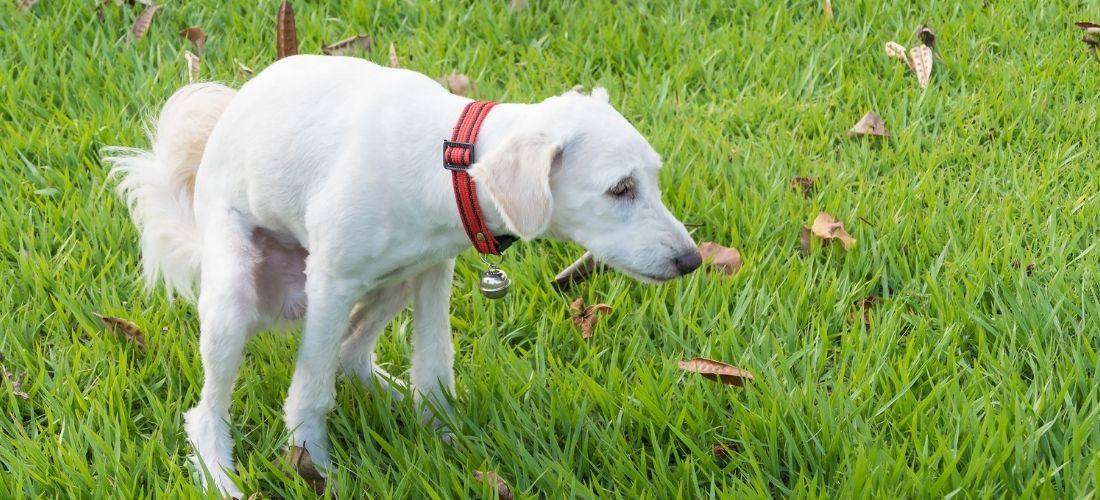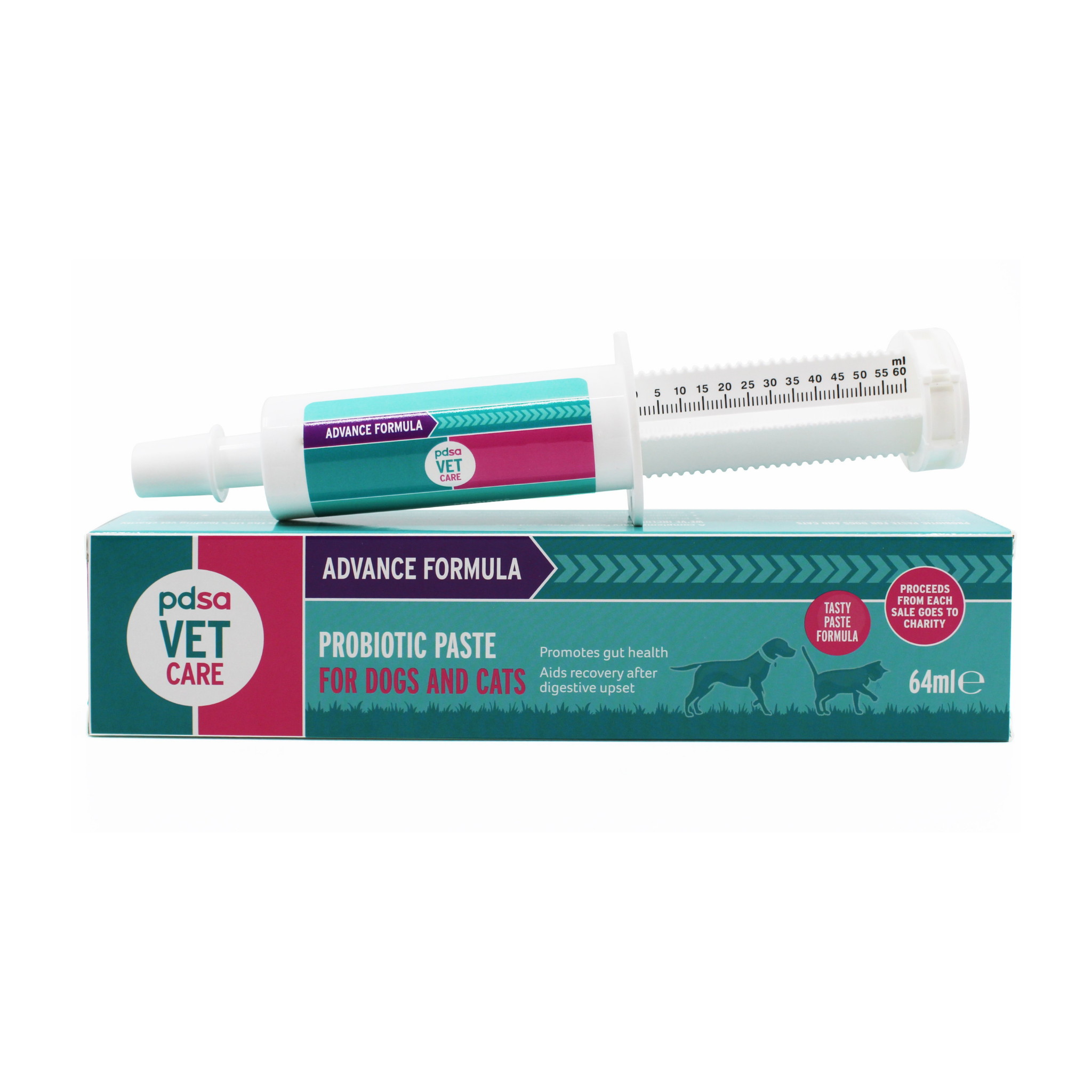Dog Diarrhoea
Overview
- There are many different things that can cause diarrhoea in dogs and puppies.
- Fortunately, most cases are mild and resolve within 24-48 hours, but it’s important to be aware that some are more serious and require veterinary attention.
- If your dog has been experiencing mild diarrhoea for less than 24 hours, you may want to try settling them at home before contacting your vet.
- If they seem unwell, or have had symptoms for more than 24 hours, it’s always best to contact your vet for advice.

Diarrhoea (loose stools) in dogs can be caused by a range of different things, including:
Eating something they shouldn’t have – if your dog eats something rich, fatty, or even just something that they aren’t used to they may experience diarrhoea and/or vomiting.
Food allergies - food allergies often cause diarrhoea and itchy skin.
Sudden change in food – a sudden change in food is likely to upset the stomach and cause soft stools/diarrhoea.
Parvovirus – this is a virus that causes very severe diarrhoea and vomiting often containing blood.
Worms – worms living in the intestines tend to cause diarrhoea, and in severe cases vomiting.
Giardia – this is a parasite that causes very severe, watery diarrhoea.
Bacterial gut infections – for example, Salmonella or Campylobacter cause severe, watery diarrhoea, usually containing blood.
Haemorrhagic gastroenteritis (HGE) – this is a condition that causes severe vomiting and bloody diarrhoea.
Colitis – this is inflammation of the large intestine, which causes soft stools and diarrhoea, usually containing fresh blood and mucus.
Gut blockage (foreign body) – blockages inside the guts tend to cause profuse vomiting, diarrhoea, and a very painful abdomen.
Inflammatory Bowel Disease (IBD) – this is a chronic inflammation of the intestines which causes ongoing diarrhoea.
Pancreatitis – this is inflammation of the pancreas (an organ that helps with digestion), which results in diarrhoea, vomiting and severe pain in the front of the abdomen.
Liver disease – symptoms of liver disease often include diarrhoea, weight loss, low energy, vomiting, and jaundice.
Exocrine Pancreatic Insufficiency (EPI) – this is a condition which stops the pancreas from working, which means the body can’t digest food properly. Dogs with EPI tend to pass large amounts of foul-smelling, pale, oily stools.

If your dog has had diarrhoea for less than 24 hours and is otherwise well, you may want to try settling their stomach at home before contacting your vet.
However, you should contact your vet for advice as soon as possible if it’s been ongoing for more than 24 hours, they have an underlying health condition, are taking any medication (especially anti-inflammatory drugs/NSAIDs), are very young, very old, seem unwell in themselves, or have any of the symptoms listed below:
- Blood and/or mucus in their diarrhoea
- Severe or constant watery diarrhoea
- Reduced appetite (eating less)
- Vomiting
- Lethargy (low energy)
- A painful stomach – dogs with a painful stomach will often yelp when they are picked up, or stand in a 'prayer position' with their front legs on the floor and hind legs stood up.
The same applies to dogs producing soft stools but not diarrhoea – if it’s been ongoing for more than 24 hours, contact your vet for advice.
What to feed a dog with diarrhoea
Our vets have put together some advice for homecare of dogs with mild diarrhoea. You should only follow this if your dog has had diarrhoea for less than 24 hours and seems otherwise fine. If your dog has any other symptoms, or seems unwell in themselves, you should contact your vet for advice. It’s also important to seek advice if you have a puppy with diarrhoea as this can be more serious.
Give plenty of water
- Make sure your dog has access to plenty of water and that they drink regularly – it’s likely that they’ll need a bit more than usual to replace the water they’re losing in their diarrhoea.
Fast for 24 hours
- Withholding food (fasting) for 24 hours might help settle your dog’s stomach and speed up their recovery. However, you shouldn’t do this if they are very young, old, or suffering from another illness.
Introduce small, frequent, bland meals
- After a 24-hour fast, start feeding your dog small frequent portions of a bland diet to gently get their guts used to food again.
- Either cook it at home using plain white rice and boiled chicken breast (no skin or bones), or buy a tinned version from your vet practice specifically for dogs that have had an upset stomach.
- Once your dog is passing solid poos you can slowly reintroduce their normal food over three to five days.
- Don’t be tempted to give your dog anything rich or fatty until they have fully recovered - this is likely to make their diarrhoea much worse!
*Don’t continue a homemade diet for more than a few days without consulting your vet.
Make sure they rest
- It’s important to let your dog rest and avoid any energetic activities until they have completely recovered from having diarrhoea.
Try Probiotics
- Probiotic pastes and powders for dogs contain a mix of friendly bacteria that are thought to top up the natural, healthy gut bacteria inside their guts.
- They can be beneficial for some dogs with diarrhoea (but not all).
- Probiotics can be bought at your vets or online.

 Video found at youtu.be/89GMvtRYwy8
Video found at youtu.be/89GMvtRYwy8
Will my dog need antibiotics?
It’s unlikely that your vet will prescribe your dog antibiotics unless they think their diarrhoea is being caused by a bacterial infection. In some circumstances, antibiotics can even make diarrhoea worse by wiping out natural, helpful gut bacteria. Instead of antibiotics, your vet may suggest alternative treatments such as probiotics.
My vet has requested a poo sample, how do I get one?
Check out our video on how to collect a poo sample from your dog. It can be difficult if they have diarrhoea so just try to collect as much as you can.
Published: May 2023
Did you find this page useful?
Tell us more
Please note, our vets and nurses are unable to respond to questions via this form. If you are concerned about your pet’s health, please contact your vet directly.
Thank you for your feedback
Want to hear more about PDSA and get pet care tips from our vet experts?
Sign up to our e-newsletter
Written by vets and vet nurses. This advice is for UK pets only. Illustrations by Samantha Elmhurst.
